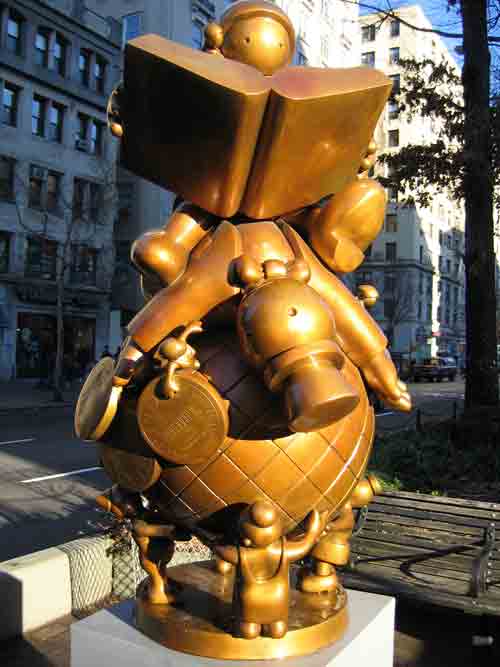
Then Jesus said to the disciples, “There was a rich man who had a manager, and charges were brought to him that this man was squandering his property. So he summoned him and said to him, ‘What is this that I hear about you? Give me an accounting of your management, because you cannot be my manager any longer.’ Then the manager said to himself, ‘What will I do, now that my master is taking the position away from me? I am not strong enough to dig, and I am ashamed to beg. I have decided what to do so that, when I am dismissed as manager, people may welcome me into their homes.’ So, summoning his master’s debtors one by one, he asked the first, ‘How much do you owe my master?’ He answered, ‘A hundred jugs of olive oil.’ He said to him, ‘Take your bill, sit down quickly, and make it fifty.’ Then he asked another, ‘And how much do you owe?’ He replied, ‘A hundred containers of wheat.’ He said to him, ‘Take your bill and make it eighty.’ And his master commended the dishonest manager because he had acted shrewdly; for the children of this age are more shrewd in dealing with their own generation than are the children of light. And I tell you, make friends for yourselves by means of dishonest wealth so that when it is gone, they may welcome you into the eternal homes. “Whoever is faithful in a very little is faithful also in much; and whoever is dishonest in a very little is dishonest also in much. If then you have not been faithful with the dishonest wealth, who will entrust to you the true riches? And if you have not been faithful with what belongs to another, who will give you what is your own? No slave can serve two masters; for a slave will either hate the one and love the other, or be devoted to the one and despise the other. You cannot serve God and wealth.”
Luke 16:1-13
The above has been called the most difficult Gospel passage in the Sunday lectionary (that’s what the preacher I listened to called it).
I already gave the link to this, but it is worth doing so again: here is my friend, bishop, and fellow blogger, Bp Peter Carrell’s work on it.
My e-friend, Rev Elizabeth Kaeton, opened it up for discussion – there are 128 comments, and she produced this sermon and blog post.
I would add tradition – including what we and others made of this text in earlier encounters with it. Those who follow the lectionary discipline read and preached on this text 12 days after the terrorist attack on the World Trade Centre and the Pentagon. If anything, this is a text about responding to wrong behaviour. What did we say on 23 September 2001, having listened to this text? How did we respond; how could we have responded; how should we have responded?
In my reading, I noted the change of people being addressed from Luke 15 to Luke 16. I saw linguistic connections between this parable and the Parable of the Prodigal Son (Prodigal Father). Brian McLaren writes about this parable in Everything Must Change seeing the steward as being wise rather than unjust, switching sides “from the service of the wealthy elite to give a break to the poor who are being crushed by the societal machinery driven by the imperial narrative”.
“And his master commended the dishonest manager (καὶ ἐπῄνεσεν ὁ κύριος τὸν οἰκονόμον τῆς ἀδικίας): It is unclear in the Greek whether Jesus is saying “his master” (as translated in NRSV) or is it Jesus who is ὁ κύριος (“The Lord”, there is no “his” in the Greek) who commended the manager?
Is this parable a reverse mirror of the Unforgiving Servant (Matt. 18)?
Might the manager be an image for Christ? Jesus, the unrespectable one, in his dying and rising raises up others…
Is this primarily about forgiving – for any and every reason? [Remember that it is Luke who, in the Lord’s Prayer, makes the odd pairing between God forgiving our sins in the way that we forgive debts! ἄφες ἡμῖν τὰς ἁμαρτίας ἡμῶν καὶ γὰρ αὐτοὶ ἀφίεμεν παντὶ ὀφείλοντι ἡμῖν]
There is an honour/shame reading of the parable – this being the primary driver of Jesus’ society. Those having their debts lessened assume that the manager is acting on the orders of the master. His rise in status through being seen to be generous outweighs the financial loss in this culture.
What do you make of the above text from Luke? If you preached on it – what did you make of it? If you listened to a sermon – what did the preacher make of it, and what do you make of it?



Since at St Mary’s in Timaru, our vicar has returned to America, we have pop up vicars coming to preach on Sundays now! Last Sunday the pop up sermon was titled; Is Church a Team Sport!?! Nehemiahs Vision to rebuild Jerusalem! Thank-you for sharing Bosco, the Luke 16: 1-13 and its links, it is I believe, a team sport as well learning.
Gods blessings Ruth